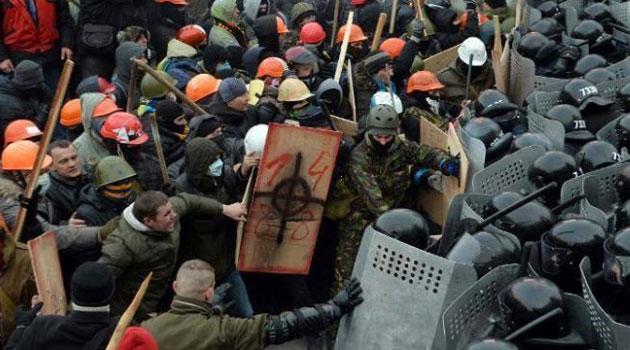Czech ultra-right invites militant neo-Nazis from Ukraine's "Right Sector" to visit

The right-wing extremist Workers’ Social Justice Party (Dělnická strana sociální spravedlnosti – DSSS) has invited a representative of the neo-Nazi group Right Sector to the Czech Republic. In addition to the democratic parties of the All-Ukrainian Union "Fatherland" (representatives: Yulia Tymoshenko, Arseniy Yatsenyuk), the Ukrainian Democratic Alliance for Reform (Vitali Klitschko) and the fascist Freedom party (Oleg Tjagnybok), Right Sector is one of the most significant radical groups participating in the current revolutionary changes in Ukraine.
"According to the most recent developments of events in Ukraine, it is evident that it was precisely the members and sympathizers of Right Sector who played a decisive role in the protests that the pro-European collaborators led by Klitschko and Tymoshenko have been and still are doing their best to co-opt," the DSSS writes in its press release about the invitation. As many as 100 000 people in Ukraine follow the Right Sector movement on social networks; the group mainly brings together right-wing radicals from various nationalist groups (the Trident of Stepan Bandera, Ukrainian Nationalists, Patriots of Ukraine or White Hammer), including Dynamo Kiev football hooligans who have piggy-backed on legitimate protests against the former government powers.
The term "sector" in the organization’s title is used to refer to the different sections of stands in a football stadium. Experts believe it is a loose association of right-wing radicals from all over Ukraine.
Groups of masked Right Sector fighters attacked police officers during the recent demonstrations with bottles filled with flammable substances, iron bars, and rocks, using "trophy" police shields won during the street fighting to defend themselves. Some photographs have shown the fighters using homemade shields with various symbols on them such as Odin’s Cross, a symbol used by the Ku-klux-klan, or the neo-Nazi code numbers 14 (for the 14 words of David Lane) and 88 (which stands for "Heil Hitler").
Right Sector has about 300 active members. It is the radical part of the main political force of the ultra-right in Ukraine, the Freedom Party, which is led by Tjagnybok.
"If I were to look for an example and compare it to an ultra-right group in Eastern Europe, then it is definitely like Hungary’s Jobbik. Freedom is rather similar, it is a political party with it’s own proposal for a constitution that would introduce many horrible things such as a the death penalty for so-called ‘anti-Ukrainian activities’, which need no further commentary. Essentially anything that goes against the party could be considered ‘anti-Ukrainian’," the Antifa.cz website quoted a Ukrainian anarcho-syndicalist named Denys as saying in an interview for a US radio station in Asheville.
The Freedom party espouses the legacy of the Organization of Ukrainian Nationalists (OUN), a Fascist movement from the interwar period, as well as the Ukrainian Insurgent Army (UPA) once led by the controversial figure Stepan Bandera. Svoboda identifies with the ideology of German National Socialism (according to the Annual Report of the Stephen Roth Institute for the Study of Contemporary Antisemitism and Racism) and annually celebrates the founding of the Ukrainian Waffen SS division.
The Freedom party is against Russian influence in Ukraine and defines itself as against the country’s communist past. It is also notorious for its anti-Semitic, racist rhetoric.
News server Zeit Online reports that in January 2013, Freedom members met with members of the German ultra-right party NPD (the National Democratic Party of Germany) and that the party allegedly also has ties to France’s Front National (FN) led by Marine Le Pen.
On New Year’s Day this year, Freedom organized a march of 15 000 people to celebrate Stepan Bandera’s birthday. The party used the nationalist flag, which is black and red and which the FIFA, the international governing body of the sport of football, has labeled a racist symbol and banned from use during football matches.
In the last elections, Freedom won more than 10 % of the vote. It has 38 seats in the 450-member Parliament and is the country’s fourth-strongest party.